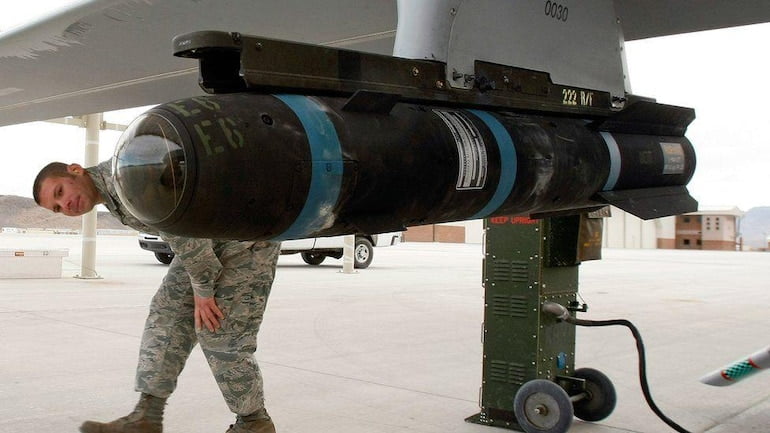The United States’ execution of al-Qaeda leader Ayman al-Zawahiri suggests that a covert Hellfire missile was used to minimise collateral damage. According to the AFP report, two missiles were fired at al-home Zawahiri’s in Kabul, killing him, but no explosion was visible in the photographs, and according to US sources, no one else was hurt.
This demonstrates that the US killed him using the gruesome Hellfire R9X missile, which is thought to have six razor-like blades instead of a warhead. To prevent collateral harm to bystanders, these missiles do not explode but instead release knife-like blades that precisely strike the targets.
The Hellfire R9X, commonly known as the flying Ginsu, doesn’t harm the area because it doesn’t carry an explosive payload. It has evolved as the preferred US weapon for assassinating extremist organisation leaders while minimising harm to civilians.
When senior al-Qaeda leader Abu al-Khayr al-Masri was killed by a drone strike while riding in a car in Syria in March 2017, the R9X first came to light. However, neither the Pentagon nor the CIA—the two US agencies known to carry out targeted killings of extremist leaders—have ever made a public admission of it.
It was used earlier when US soldiers attacked a trainer with ties to al-Qaida in Syria in 2020. Reports state that the US also employed the same weapon in 2019.
What exactly is a Hellfire R9X?
The AGM-114 Hellfire missiles are air-to-ground, laser-guided, subsonic missiles with substantial anti-tank capability, according to The Week. The warhead, guidance system, and physical characteristics of the Hellfire missile all have several variations. The Hellfire R9X is the newest and most unique missile in the Hellfire family. It is intended for targeted murders and uses pop-out sword blades to kill targets with little collateral damage. Al Arabia claims that this could have been the particular Hellfire missile that was used to kill Iranian General Qasem Soleimani.
The R9X, which was reportedly developed under the Obama administration with a focus on reducing civilian casualties, “comes equipped with a different kind of payload: a halo of six long blades that are stowed inside and then deploy through the skin of the missile seconds before impact to ensure that it shreds anything in its tracks,” according to the Wall Street Journal. It rarely left any traces, unlike a typical Hellfire missile—no burns or scorches aside from cracks or points of entry.
The R9X, which also goes by the name Ninja bomb, weighs roughly 45 kg. The missile can also be fired from the drones, helicopters, planes, and Humvees that US forces use to quickly mobilise ground forces. Depending on the type being deployed, these missiles have a range that ranges from 500 metres to 11 kilometres.
Based on particular intelligence, the US utilised a drone in this operation to attack the target.
During the presidency of former president Barack Obama, drone attacks significantly increased. The US policy of excessive drone use has frequently sparked debate over allegations of innocent casualties, yet Hellfire reduces collateral damage.
The MQ9 Reaper, commonly referred to as Predator drones, are capable of successfully launching these. These drones’ built-in sensors and radars can be used to find targets. With a range of 6,000 nautical miles and a ceiling of 50,000 feet, it can fly for more than 27 hours and carry weights of up to roughly 1,700 kg. They are an effective weapon since they can carry deadly Hellfire missiles and laser-guided bombs.
In addition to the US military, India has expressed interest in arming its troops with armed drones.
30 weaponized drones made by the US company General Atomics were to be purchased for $ 3 billion, but no agreement has been reached as of yet. The army, navy, and air force were each to get 10 of these combat drones.
Drone attacks can be executed by launching bombs, shooting missiles, or ramming the target with an armed UAV. The drones’ stealth capabilities enable them to make deep penetrations while remaining unnoticed.
To ensure fewer losses, the US military has likewise embraced the drone warfare tactic. More recently, Azerbaijan attacked Armenia using armed drones, while Ukraine heavily utilised UAVS in its continuing conflict with Russia.
Drones could eventually represent a serious threat to vital civilian infrastructure, including dams, power plants, and bridges, in addition to military objectives.
Al-Zawahiri, an Egyptian-born surgeon who took over as head of al-Qaida after Osama bin Laden was killed, passed away at the age of 71 in a drone attack in Kabul, Afghanistan. Zawahiri was wanted for $25 million and assisted in planning the attacks of September 11, 2001, which claimed the lives of close to 3,000 people.
